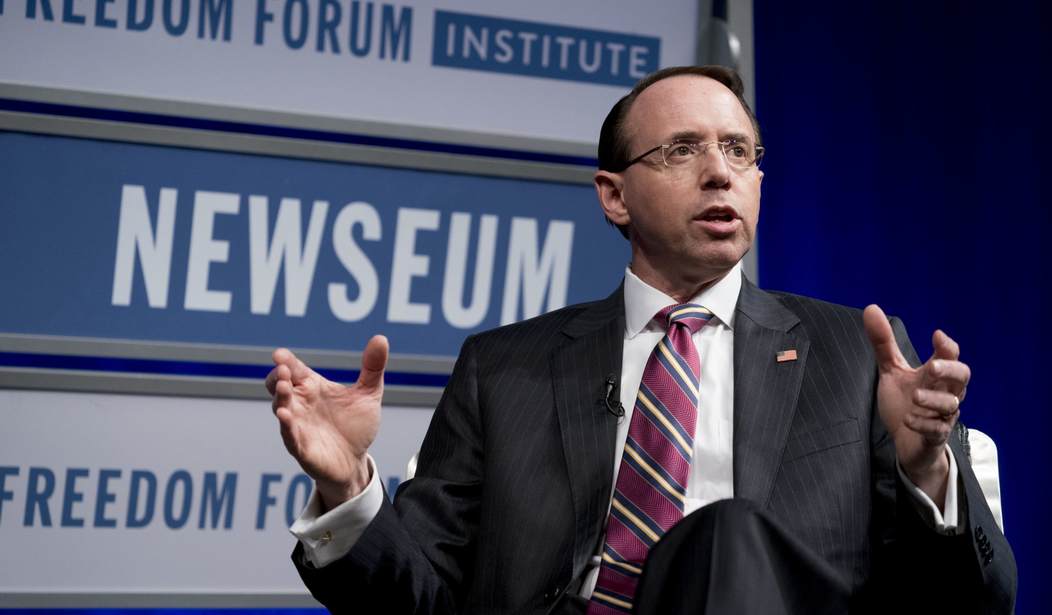WASHINGTON — Deputy Attorney General Rod Rosenstein said today that House conservatives should understand “the Department of Justice is not going to be extorted” by drafting articles of impeachment against the DOJ’s second-in-command.
Rosenstein, speaking at the Newseum for a Law Day event, was asked about the articles that Rep. Mark Meadows (R-N.C.), chairman of the House Freedom Caucus, told the Washington Post would be used if DOJ fails to respond to document requests tied to their probe of Russia investigation investigators.
“They can’t even resist leaking their own drafts,” Rosenstein quipped about the Post story, eliciting laughter from the audience.
“I just don’t have anything to say about documents like that that nobody has the courage to put their name on and that they leak in that way. But I can tell you that there have been people who have been making threats, privately and publicly, against me for quite some time. And I think they should understand by now, the Department of Justice is not going to be extorted,” he said.
“We’re going to do what’s required by the rule of law. And any kind of threats that anybody makes are not going to affect the way we do our job. We have a responsibility. And we take an oath. That’s the whole point.”
Rosenstein said earlier in the discussion that “it’s important for us to take opportunities like this to get out the word about the rule of law, to explain what it means and why it’s so critical to our democracy.”
“I don’t think there’s any threat to the rule of law in America today. The reason for that is that the rule of law in America is protected by two things: the Constitution and the culture,” he said, acknowledging “there are always disputes at the margins between the branches, differences of agreement over issues” but “the fundamental structure set up by the separation of powers is really important to guarding the rule of law.”
President Trump warned in a Fox News interview last week that the DOJ is something “which I try and stay away from, but at some point I won’t.” Rosenstein was asked if the Justice Department currently has independence.
“The Justice Department is independent of inappropriate political considerations. I think it’s important to recognize it’s not independent of the executive branch,” he replied. “The department has a responsibility to be in accord with the priorities of the administration. And that’s what elections are for. We have changes of priorities. We change our emphasis. We change some of our policies.”
“But, in the independent — in the individual decisions we made, for example, about who to prosecute, in particular, those decisions have to be made without regard to politics,” the deputy attorney general added. “So we decide we’re going to focus on violent crime or public corruption, for example, but then, in making the decisions about which cases and which people to prosecute, we need to apply neutral principles. And that’s what we mean when we talk about the independence of the Justice Department.”
Rosenstein contended “there are no such conflicts” between the rule of law and certain demands made by the chief executive.
“The way we operate in the Department of Justice and the way this administration operates is not necessarily the way you see it characterized in the media,” he said. “There’s no doubt by anybody in the Department of Justice that we are complying with the rule of law. We are enforcing the priorities of the administration. There have been significant changes, obviously, in some of the department’s priorities. But we apply them in a way that’s consistent with the rule of law.”
He stressed that in his leadership role he bears a responsibility “to defend the independence and integrity of the Department of Justice.”
“If we were to just open our doors to allow Congress to come and rummage through the files, that would be a serious infringement on the separation of powers. And it might resolve a dispute today, but it would have negative repercussions in the long run, and we have a responsibility to defend the institution.”
Asked if he was the best person to oversee special counsel Robert Mueller’s investigation, given his role in drafting the memo outlining administration reasons for firing former FBI Director James Comey, Rosenstein replied, “I don’t comment on investigations. I don’t comment on what we are investigating. I don’t comment on what we’re not investigating.”
“And I can tell you, a lot of things I — I read in the media or see on cable TV just aren’t true. And people say, ‘Well, if it’s not true, why don’t you correct it?’ And the answer is, because that’s just not the way we operate,” he added. “And we conduct investigations in secret. If we have a basis to prosecute somebody, we prosecute them. If we don’t, we close our file and we go home.”
On the subject of Justice Department morale, Rosenstein said he hears “consistently” from U.S. Attorneys, support staff and law enforcement “that they feel they are being supported by the Department of Justice, and they feel that we have their backs and that we are doing what we need to do to help them suppress crime.”
“Obviously, nobody likes to see criticism in the news media, but our folks — you have to recognize, these are career folks who have chosen this career, and they understand that issues are going to heat up in the media from time to time,” he said. “They’re indicating, or from their perspective, as long as we’re protecting their ability to do their job with integrity, and they’re investigating and prosecuting the right cases, I think their morale’s going to remain high.”









Join the conversation as a VIP Member